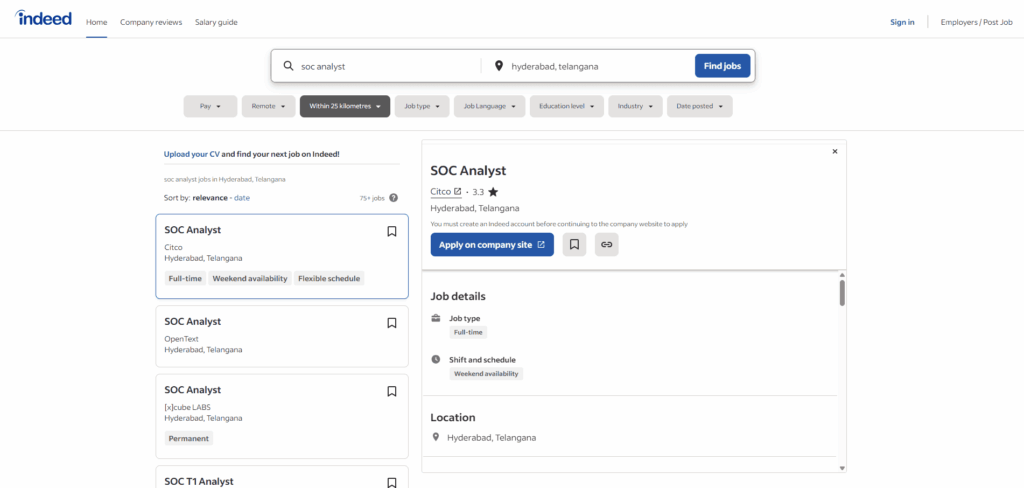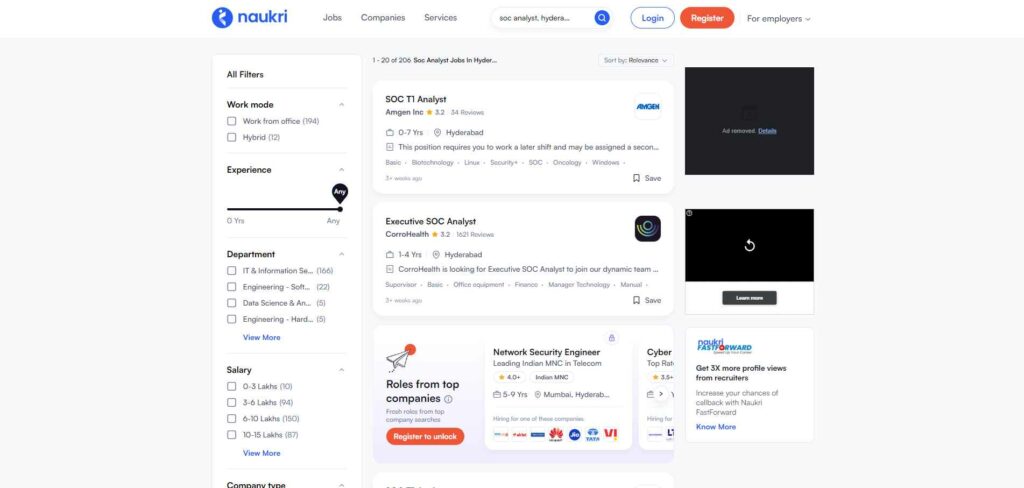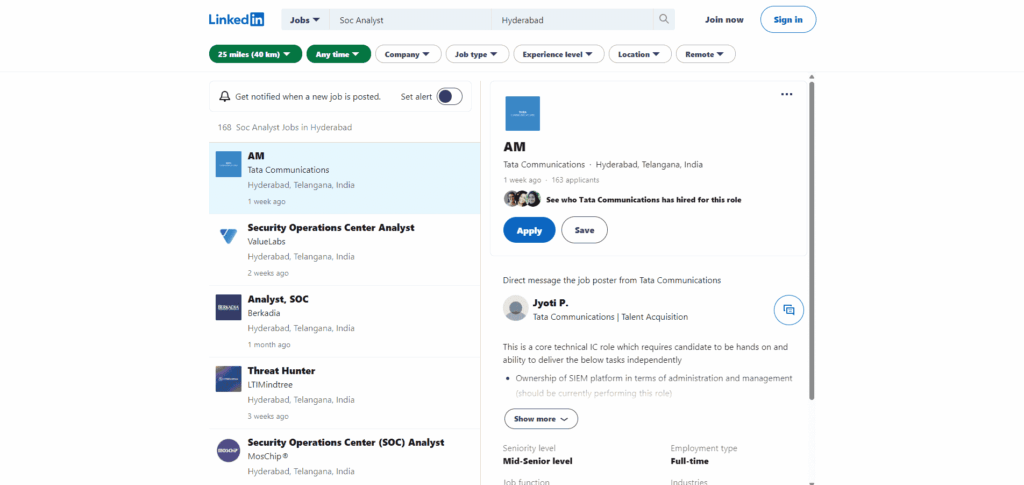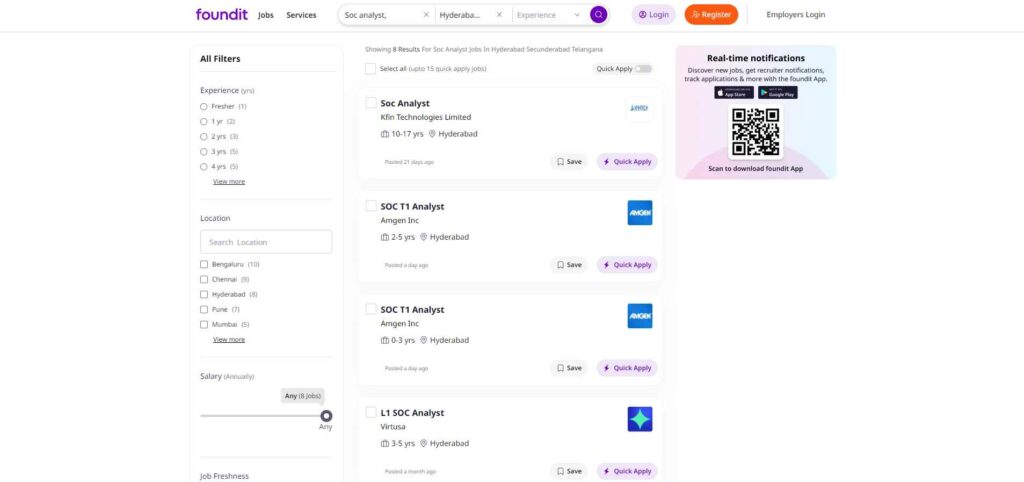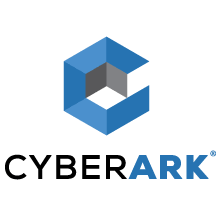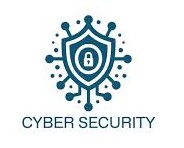SOC Analyst Training in Hyderabad
With
Certification Guarantee & 100% Placement Assistance
Online & Classroom SOC Analyst Course | 3 Months Duration | SIEM Projects | Internship Support | SOC Certification Guidance
Our SOC Analyst Course in Hyderabad helps you build real cybersecurity skills step by step. You will practice on SIEM tools, learn to detect attacks, monitor logs, and respond to threats. After completing the course, you will receive a SOC Analyst Certification from Brolly Academy along with 100% placement assistance and internship support to launch your career.
Table of Contents
ToggleSOC Analyst Training in Hyderabad – Next Batch Details
Next Batch Details
| Trainer Name | Mr. Praveen K (Certified Trainer) & Mr. Sandeep Reddy (Certified Trainer) |
| Trainer Experience | 10+ Years in Cyber Security, SOC Operations & Training |
| Next Batch Date | 27 Jan 2026 8 : 15 AM |
| Training Modes: | Online Training (Instructor-Led) / Classroom (Hyderabad) / Hybrid |
| Course Duration: | 3 Months (with Internship & Certification) |
| Call us at: | +91 81868 44555 |
| Email Us at: | brollyacademy@gmail.com |
| Demo Class Details: | ENROLL FOR FREE DEMO CLASS |
Why Brolly Academy is the Best Training Institute in Hyderabad
10000+
Placements Achieved
300+
Google Reviews
4.8
Ratings
20,000+
Students Trained
3 Months
Duration
Modes
Classroom & Online
Fee Range
Affordable
46+
Projects Completed
Why Choose Brolly Academy for SOC Analyst Training in Hyderabad
- Why Choose Brolly Academy for SOC Analyst Training in Hyderabad
- Learn SOC Fundamentals and Cyber Security Basics
- Training on SIEM Tools like Splunk, ELK, QRadar
- Accredited SOC Analyst Certification Provided
- 100% Placement Assistance with HR Support
- Resume Building and Career Guidance Sessions
- Internship Opportunities with Partner Companies
- Access to 100+ SOC Analyst Interview Questions
- Dedicated Doubt Clarification Sessions Weekly
- Unlimited Batch Access for One Full Year
- Lifetime LMS and Recorded Class Video Access
- Real-Time Security Projects and Case Studies
- Updated Curriculum with Latest SOC Practices
- SOC Online and Classroom Training Modes
- Flexible Weekday and Weekend Batch Options
- Downloadable Notes and Study Resources
SOC Training Course in Hyderabad
SOC Analyst Course Syllabus
- Understanding Cybersecurity Fundamentals
- Introduction to cybersecurity terminologies
- Importance of cybersecurity in modern businesses
- Key players in the cybersecurity ecosystem
- Cybersecurity Threat Landscape
- Types of cyber threats: Malware, Phishing, Ransomware, etc.
- Real-world examples of cyber attacks
- Key threat actors (individuals, groups, nation-states)
- Roles & Responsibilities of a SOC Analyst
- Daily tasks of a SOC Analyst
- Role within an organization
- Understanding the hierarchy in SOC teams
- Introduction to SOC
- What is a SOC?
- Key components and architecture of a SOC
- Types of SOC
- Dedicated, Virtual, and Distributed SOCs
- Managed Security Service Providers (MSSPs)
- SOC Workflow and Processes
- Incident response process
- Escalation procedures
- Ticketing systems and reporting
- Networking Basics
- OSI Model, TCP/IP Protocol Suite
- Common protocols: HTTP, DNS, FTP, etc.
- Understanding IP addressing and subnetting
- Firewalls and Network Devices
- Types of firewalls and configurations
- Role of switches, routers, and IDS/IPS in network security
- Packet Analysis
- Introduction to Wireshark
- Capturing and analyzing network traffic
- Understanding packet headers and flows
- Introduction to SIEM Tools
- What is SIEM? Importance for SOC analysts
- Common SIEM tools: Splunk, QRadar, ArcSight
- SIEM Deployment and Architecture
- SIEM infrastructure setup and configuration
- Log Management and Analysis
- Importance of logs in security monitoring
- Log sources: Network devices, firewalls, endpoints
- Event Correlation and Incident Detection
- Creating and tuning correlation rules
- Alerting and monitoring suspicious activities
- Understanding Threat Intelligence
- Introduction to threat intelligence and its types
- Sources of threat intelligence: Open-source vs. commercial
- Threat Intelligence Platforms (TIPs)
- How to use TIPs effectively
- Integrating TIPs with SIEM
- Threat Hunting
- Proactive vs. reactive threat hunting
- Frameworks: MITRE ATT&CK, Cyber Kill Chain
- Threat hunting use cases
- Introduction to Incident Response (IR)
- Incident response lifecycle
- Incident types and their severity
- Incident Triage and Escalation
- How to prioritize incidents
- Steps to escalate incidents to higher levels
- Incident Containment and Remediation
- Containment strategies: Short-term vs. long-term
- Remediation actions and post-incident analysis
- Root Cause Analysis
- Analyzing the root cause of incidents
- Writing incident reports
- Introduction to Malware Types
- Types of malware: Viruses, Worms, Trojans, etc.
- Malware delivery mechanisms
- Malware Analysis Techniques
- Static vs. dynamic analysis
- Tools: IDA Pro, OllyDbg, Cuckoo Sandbox
- Reverse Engineering Basics
- Introduction to reverse engineering malware
- Identifying Indicators of Compromise (IOCs)
- Endpoint Protection Mechanisms
- Endpoint Detection and Response (EDR)
- Antivirus vs. EDR vs. XDR
- Securing Endpoints
- Hardening workstations and servers
- Best practices for endpoint security
- Analyzing Endpoint Logs
- Analyzing logs from EDR solutions
- Detecting anomalous behavior on endpoints
- Introduction to Vulnerabilities and Exploits
- Common vulnerability types: SQLi, XSS, Buffer Overflows
- Real-world examples of exploited vulnerabilities
- Vulnerability Scanning Tools
- Tools: Nessus, OpenVAS
- Interpreting scan results and risk prioritization
- Patch Management
- Importance of patching
- Automating the patch management process
- Introduction to Compliance Requirements
- Key regulations: GDPR, HIPAA, PCI-DSS, etc.
- How SOC analysts contribute to compliance
- Security Frameworks
- NIST, ISO 27001, CIS Controls
- Implementing Best Practices
- Role of SOC in maintaining security posture
- Documenting security policies and procedures
- Real-World SOC Scenarios
- Simulated attacks and defense strategies
- Analyzing past incidents and response approaches
- Building Dashboards in SIEM
- Creating effective monitoring dashboards in tools like Splunk
- Incident Reporting and Documentation
- Writing detailed reports on incident response
- Creating executive summaries for management
- Real-World SOC Simulation
- Working on a full-fledged SOC environment simulation
- Handling real-time incidents and writing final reports
- Case Study Analysis
- Analyzing famous cyber incidents and lessons learned
- Final Assessment and Certification
- Mock assessments and feedback sessions
- SOC Analyst certification exam (if applicable)
- Real-World SOC Simulation
- Understanding Red Team and Blue Team Roles
- Red Team: Offensive security testing (penetration testing)
- Blue Team: Defensive security operations (SOC)
- Importance of Red vs. Blue team engagements in improving SOC capabilities
- Red Team Tactics and Techniques
- Common Red Team techniques used to exploit vulnerabilities
- Tools: Metasploit, Burp Suite, Kali Linux
- Blue Team Defensive Strategies
- Strengthening defenses based on Red Team findings
- Monitoring and detecting Red Team activities
- Purple Team Collaboration
- Bridging the gap between offensive and defensive security teams
- Enhancing security posture through collaboration
- Behavioral Analysis
- Analyzing user and entity behavior using UEBA tools (User and Entity Behavior Analytics)
- Identifying abnormal behaviors and insider threats
- AI and Machine Learning in SOC
- Introduction to machine learning techniques for threat detection
- Role of AI in automating security monitoring and response
- AI tools and platforms: Darktrace, Vectra, CrowdStrike
- Threat Detection in Cloud Environments
- Securing cloud services like AWS, Azure, GCP
- Detecting threats in hybrid and multi-cloud environments
- Cloud security tools: Prisma Cloud, Microsoft Defender, AWS GuardDuty
- Career Pathways for SOC Analysts
- Typical career progression: SOC Analyst Level 1 → Level 2 → Incident Response Lead → SOC Manager
- Other career paths: Cybersecurity consultant, Penetration tester, Forensics analyst
- Certifications for SOC Analysts
- Popular certifications: CompTIA Security+, EC-Council CEH (Certified Ethical Hacker), CISSP, GCIH (GIAC Certified Incident Handler)
- Guidance on preparing for these certifications
- Resume Building and Interview Preparation
- Tailoring your resume for SOC Analyst positions
- Key skills and achievements to highlight
- Common SOC Analyst interview questions and preparation tips
SOC Training In Hyderabad
SOC Analyst Training Roadmap
Our SOC Analyst Training in Hyderabad is designed to take you from beginner to job-ready professional in just 3 months. Each stage focuses on core SOC and cybersecurity skills — from learning fundamentals to mastering SIEM tools and handling real-world incidents. You will finish with certification, placement support, and internship experience through Brolly Academy.
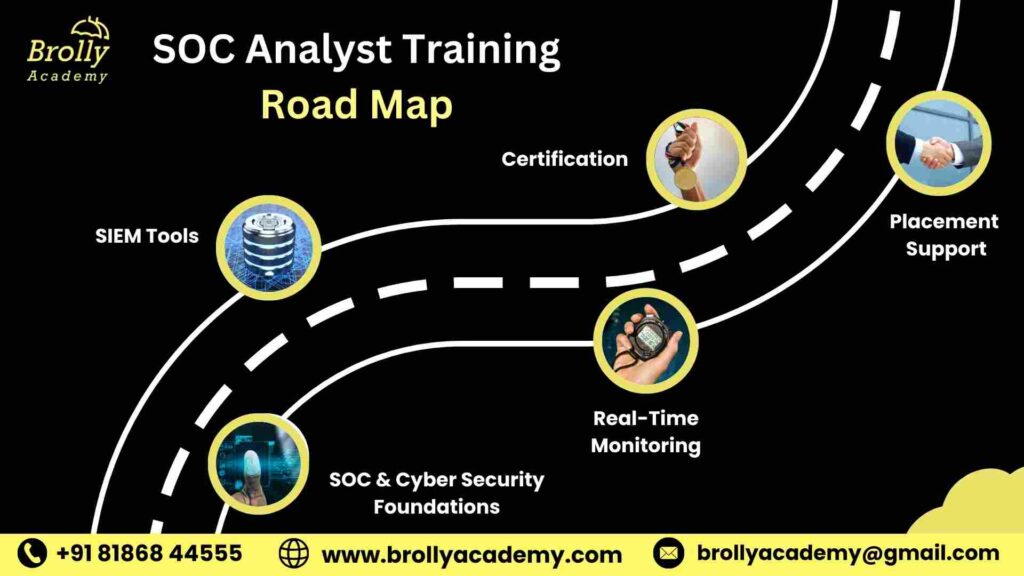
01
Month 1 – SOC & Cyber Security Foundations
- Brolly Academy covers networking & security basics
- Learn SOC operations, log analysis, and incident response
- Hands-on practice with Windows & Linux environments
02
Month 2 – SIEM Tools & Real-Time Monitoring
- Training on Splunk, ELK, QRadar, Azure Sentinel
- Work on real-time SOC projects & threat detection
- Gain skills in log monitoring, vulnerability assessment
03
Final Phase – Certification & Placement Support
- SOC Analyst Certification in Hyderabad from Brolly Academy
- Resume building, HR guidance & mock interviews included
- Access to 100+ SOC Analyst interview questions
- Internship until placement with full job assistance
What is SOC?
SOC (Security Operations Center) is the central unit in an organization where cyber security professionals monitor, detect, analyze, and respond to security threats. It works 24/7 to keep systems, networks, and data safe.
- Definition – A SOC is a team and facility that protects an organization’s IT systems against cyber attacks and data breaches.
- Main Functions – Continuous monitoring, log collection, threat detection, incident response, and reporting.
- SOC Team Roles, L1 Analyst - Monitors alerts from SIEM tools, L2 Analyst - Investigates incidents in detail, L3 Analyst / SOC Manager - Handles advanced threats & manages the team
- SOC Tools – Security teams rely on SIEM platforms like Splunk, ELK Stack, QRadar, and Azure Sentinel to detect suspicious activity.
- Processes Inside SOC –Log monitoring,Intrusion detection,Incident response,Threat hunting,Vulnerability management.
- Industry Adoption – Banks, IT companies, telecom, healthcare, and government agencies all depend on SOCs for protection.
- Career Scope – SOC Analysts are in high demand. In Hyderabad, salaries range from ₹4.5 LPA to ₹12 LPA, depending on skills and experience.
- SOC Training in Hyderabad – At Brolly Academy, students learn SOC fundamentals, SIEM tools, incident handling, and real-time projects, leading to certification and job placement.
- Importance – A SOC reduces the risk of cyber attacks, ensures compliance with regulations, and helps businesses maintain trust.
Why SOC is Important?
Reason | Explanation | Real-World Example |
1. Threat Detection | SOC monitors systems to detect viruses, malware, and suspicious activity. | A Hyderabad bank’s SOC stopped a phishing attack by spotting unusual login attempts. |
2. Incident Response | Analysts investigate and respond quickly to reduce damage from cyber attacks. | An IT company’s SOC handled a ransomware alert, preventing server shutdown. |
3. 24/7 Monitoring | SOC teams watch systems all day, every day to keep networks safe. | Global MNCs like Infosys and Deloitte run SOCs with round-the-clock monitoring. |
4. Compliance | Ensures companies meet legal and security rules like GDPR, PCI-DSS, ISO. | E-commerce firms use SOC for PCI compliance in online payments. |
5. Data Protection | Protects sensitive information from leaks or theft. | A healthcare company’s SOC secured patient data from unauthorized access. |
6. SIEM Tools Usage | SOC Analysts work with SIEM tools (Splunk, QRadar, ELK, Azure Sentinel). | Brolly Academy students practice SIEM in real-time projects during SOC training. |
7. Cyber Security Skills | Builds expertise in log analysis, threat hunting, and vulnerability management. | Freshers in Hyderabad trained in SOC Analyst Courses secure jobs in top MNCs. |
8. Business Trust | Companies with SOCs gain customer confidence by keeping services safe. | Hyderabad fintech startups highlight SOC monitoring to attract investors. |
9. Career Opportunities | SOC Analysts are in high demand with salaries from ₹4.5–₹12 LPA. | Brolly Academy’s SOC Analyst Training in Hyderabad places students in MNCs & IT firms. |

Benefits of SOC Analyst Training in Hyderabad
Benefits of the Course
The requirement for cyber security jobs in Hyderabad is growing fast. Companies need skilled SOC Analysts to protect networks, detect threats, and handle incidents. Brolly Academy’s SOC Analyst Training in Hyderabad gives you hands-on practice with SIEM tools, real-time monitoring, and cyber defense projects, along with certification and placement support to make you job-ready.
1. Global Career Opportunities
At Brolly Academy Hyderabad, you gain SOC skills that are valued worldwide. Tools like Splunk, QRadar, ELK, and Azure Sentinel prepare you for jobs in MNCs and international companies.
2.High-Paying Roles
Brolly Academy-trained SOC Analysts in Hyderabad earn between ₹4.5 LPA and ₹12 LPA, higher than many entry-level IT jobs, especially with certification.
3. Diverse Job Profiles
After completing the SOC Analyst Course at Brolly Academy, you can work as an L1/L2/L3 SOC Analyst, Incident Responder, Threat Hunter, Security Engineer, or Cyber Security Analyst.
4.Remote & Hybrid Work Options
Many SOC Analyst jobs allow remote or hybrid work. With Brolly Academy’s SOC training, you’ll be equipped to handle monitoring roles from anywhere.
5. Industry-Relevant Skills
Brolly Academy’s SOC Analyst Training in Hyderabad covers log analysis, incident response, vulnerability management, and threat hunting with hands-on projects.
6.Cross-Industry Demand
Graduates from Brolly Academy Hyderabad are placed in banking, healthcare, telecom, SaaS, and IT companies, proving that SOC skills are essential across industries.
7.Startup & Freelance Opportunities
With the knowledge gained from Brolly Academy’s SOC Analyst Course, you can also work as a freelancer or consultant, providing cyber defense services to startups and enterprises.
8. Future-Proof Career
Cyber threats are increasing daily. Brolly Academy ensures your SOC Analyst skills stay up to date with the latest SIEM tools and cyber security practices.
9. Faster Career Transitions
Even non-IT professionals can switch careers. With Brolly Academy’s SOC Analyst Training in Hyderabad, you can become job-ready in just 3 months.
Thinking of Joining SOC Analyst Training in Hyderabad?
- Traditional Training
- Mostly theory, no real-time SOC monitoring.
- Trainers with general IT background.
- Covers only basic cyber security concepts.
- No placement or career support.
- Limited exposure to tools.
- Exercises not linked to real incidents.
- No focus on certification.
- No exposure to cyber defense strategies.
- Outdated curriculum not aligned with current industry practices.
- Generalized training.
- Insufficient interaction with real-world cyber security professionals.
- Brolly Academy Training
- Hands-on SOC Analyst Training with live SIEM tools (Splunk, QRadar, ELK, Sentinel).
- Certified SOC Experts with 15+ years of cyber security & MNC experience.
- Advanced curriculum: SOC operations, incident response, threat hunting, log analysis, SIEM alerts.
- 100% placement support with resume prep, interview guidance & HR referrals.
- Training on industry-leading SIEM tools like Splunk, QRadar, ELK Stack, and Azure Sentinel.
- Prepares for SOC Analyst Certification, CompTIA Security+, CEH, and SIEM certifications.
- Learn incident detection, malware analysis, log monitoring, and risk mitigation.
- Customized SOC Analyst Course Roadmap for freshers, professionals, and career switchers.
SOC Analyst Training in Hyderabad – Trainers
Meet Our Certified SOC Analyst Trainers
INSTRUCTOR
Experience: Expertise 15+ Years in Cyber Security and SOC Operations
About the tutor:
Mr. Praveen K is a certified SOC Analyst trainer at Brolly Academy with more than 15 years of real-world experience in cyber security and SOC operations. He has worked with leading MNCs, handling incident response, log monitoring, and SIEM platforms like Splunk, QRadar, ArcSight, and ELK Stack.
Key Highlights:
- Specialist in SOC operations & incident response
- Expert in SIEM tools training (Splunk, QRadar, ArcSight, ELK)
- Trained 1,000+ students for SOC Analyst jobs
- Provides hands-on labs, real projects, and case-based learning
Focus Areas in Training:
- Threat hunting & log analysis
- Incident detection & response skills
- Cyber security compliance & reporting standards
- Career-building support for SOC Analyst roles
INSTRUCTOR
Experience: 15+ Years of Specialized Expertise in Threat Detection & Cloud SOC
About the tutor:
Mr. Sandeep Reddy is an experienced SOC and Cyber Security professional at Brolly Academy, with over 15 years in threat detection, cloud SOC operations, and SIEM implementations. He has mentored professionals from banking, telecom, and IT sectors, enabling them to move into high-paying SOC Analyst careers in Hyderabad and abroad.
Key Highlights:
- Skilled in vulnerability management, cloud SOC monitoring, and network security,
- Strong background in SOC automation & enterprise security frameworks
- Provides resume building, interview guidance & career mentoring
- Helps students achieve globally recognized SOC Analyst certifications
- Vulnerability management practices
- SOC automation tools & frameworks
- Cloud SOC monitoring & defense skillsJob-oriented SOC Analyst career training
Focus Areas in Training:

You Will Learn in SOC Analyst Training in Hyderabad
At Brolly Academy, you will learn job-ready SOC and Cyber Security skills step by step. By the end of this SOC Analyst Training in Hyderabad, you’ll have both technical expertise and practical experience for placements.
Skills You Will Learn at Brolly Academy
- SOC Operations & Monitoring : You will learn how a Security Operations Center works, including monitoring alerts, tracking incidents, and securing enterprise systems.
- SIEM Tools Training : At Brolly Academy, you will practice with industry tools like Splunk, QRadar, ArcSight, and ELK Stack for log monitoring, analysis, and threat detection.
- Threat Hunting & Incident Response : You will learn how to detect suspicious activities, analyze security events, and respond to cyber attacks in real time.
- Network Security Basics : You will understand firewalls, IDS/IPS, and vulnerability scanning, which are essential for every SOC Analyst.
- Malware & Attack Analysis : You will learn to detect and handle phishing, ransomware, brute-force, and insider threats using SOC frameworks.
- SOC Reporting & Documentation : At Brolly Academy, you will practice writing clear incident reports, compliance documents, and dashboards for security audits.
- Cloud SOC Monitoring : You will get exposure to cloud platforms like AWS, Azure, and Google Cloud SOC, which are highly in demand.
- Security Automation : You will learn how to use SOAR tools and playbooks to automate repetitive SOC tasks for faster response.
- Compliance & Governance : You will understand standards like ISO 27001, GDPR, HIPAA, and SOC regulations required in MNCs.
- Job-Focused SOC Analyst Skills : Brolly Academy will provide you with 100+ SOC Analyst interview questions, resume preparation, mock interviews, and HR guidance to secure high-paying SOC jobs in Hyderabad.
SOC Analyst Training in Hyderabad
In Brolly Academy’s SOC Analyst Coaching in Hyderabad, every learner works on live projects that build the same skills used in real SOC teams. These projects help you practice incident detection, SIEM tools, log monitoring, and cyber security investigations so you’re ready for jobs right after training.
SOC Capstone Projects You Will Work On
1. Log Monitoring Project
Simulate real cyberattacks like phishing or ransomware. Practice step-by-step incident investigation and reporting. Follow SOC playbooks used in MNCs
2. Incident Response Project
Simulate real cyberattacks like phishing or ransomware. Practice step-by-step incident investigation and reporting. Follow SOC playbooks used in MNCs
3. SIEM Dashboard Project
Create SOC dashboards for daily monitoring. Track alerts, user activities, and anomalies. Generate reports for managers and compliance teams
4. Cloud SOC Project
Monitor security in AWS and Azure environments. Spot unusual logins, access risks, and API misuse. Apply cloud security monitoring practices used by enterprises.
5. Security Automation Project
Automate routine SOC tasks with SOAR playbooks. Reduce false positives and speed up responses. Learn how automation saves time in real SOC centers.
6. Compliance & Audit Project
Work with ISO 27001, GDPR, HIPAA standards. Learn how SOC analysts prepare compliance-ready reports. Get job-ready for companies that require regulatory security monitoring
SOC Analyst Course Fees & Training Modes in Hyderabad
The SOC Analyst Training in Hyderabad at Brolly Academy is available in three flexible learning options: video recordings, SOC Analyst Online Training, and Classroom Training. Each mode is designed to provide hands-on SOC projects, SIEM tools practice, certification, and placement assistance to make you job-ready.
SOC Training Fee & Offerings
Video Recording
Rs 15,000 9,999
- Lifetime access to all recorded SOC Analyst sessions
- Step-by-step learning from fundamentals to advanced SOC operations
- 80+ recorded classes with practical lab exercises
- Capstone project on SOC operations and incident handling
- Resume preparation and interview guidance
- Placement assistance until hired
- WhatsApp group access for discussions and updates
Class Room Training
Rs 35,000 29,999
- 2.5 months structured classroom training in Hyderabad
- Sessions led by certified SOC Analyst trainers with 15+ years of experience
- Real-time industry projects with Splunk, QRadar, ELK, and ArcSight
- One-on-one mentorship and career guidance
- Monthly mock interviews and aptitude training
- Resume and LinkedIn profile building support
- Dedicated placement officer with job referrals
- Offline batches with commute support
- WhatsApp group access for continuous learning support
- WhatsApp support + group access
Online Course
Rs 30,000 24,999
- Live interactive SOC Analyst classes with flexible timings
- Duration: 2.5 – 3 months
- Daily recorded sessions available for revision
- Real-time SIEM project experience from Day 1
- Weekly mock interviews and doubt clarification sessions
- 50+ sample resumes and interview resources provided
- Placement guidance and HR support
- WhatsApp group support for regular updates and Q&A
Our Placement Process for SOC Analyst Training in Hyderabad
SOC Analyst Training and Placement
At Brolly Academy, SOC Analyst training is not just about teaching cyber security skills – it’s about making you job-ready. Our structured placement process ensures every student gets the right support, from resume preparation to final offer letters.

Resume Building

Placement Training

Interview Questions
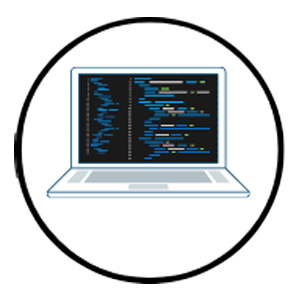
Realtime Live Projects

Get Offer Letter

Scheduling Interviews

Mock Interviews

Personality Development
- Resume Building – We help you create a strong SOC-focused resume that highlights your knowledge in SIEM tools like Splunk, QRadar, ArcSight, and ELK Stack, along with threat detection and incident response projects.
- Placement Training – Our team trains you on how to present your skills to recruiters, what SOC Analyst job roles demand, and how to stand out in interviews.
- Internships Under Experts – Get internship opportunities guided by senior cyber security professionals to gain real SOC environment exposure.
- Realtime Live Projects – Work on live SOC projects using SIEM tools to handle log monitoring, alert analysis, and incident response, just like in an enterprise SOC.
- Aptitude Preparation – Build your logical thinking and problem-solving skills with SOC-based exercises that recruiters test during the selection process.
- Personality Development – Improve communication, presentation, and reporting skills, essential for explaining SOC incidents and security alerts clearly in interviews and job roles.
- Mock Interviews – Take part in multiple mock interviews with trainers and placement experts to build confidence before your actual interviews.
- Scheduling Interviews – Brolly Academy’s placement cell connects you with hiring partners and SOC job openings across Hyderabad.
- Get Offer Letter – With our complete placement support, you’ll secure your SOC Analyst job offer and begin your cyber security career.
What Our Students Say About SOC Training in Hyderabad
Testimonials
SOC Analyst Training Student Community in Hyderabad
Student Community

Learning & Collaboration
At Brolly Academy, you’ll practice SOC operations with your peers by working on real-time labs, log analysis, and security alerts. This teamwork helps you gain confidence and problem-solving skills needed for real SOC environments.

Hands-on Tools & Materials
Students get full access to SIEM tools like Splunk, QRadar, ELK, and ArcSight, along with recorded classes, notes, and interview prep material. These resources make your training both practical and job-ready.

Industry Networking
Be part of a strong cyber security network. Meet and interact with SOC professionals, cyber security experts, and recruiters from Hyderabad’s leading IT companies. Networking opens the door to internships, projects, and jobs.

Expert Mentorship
Learn under the guidance of certified SOC Analyst trainers with 15+ years of experience. Trainers guide you step by step in threat detection, incident response, and security monitoring, helping you build skills companies actually need.

Career & Job Support
Get placement-driven support including resume reviews, mock interviews, internship opportunities, freelancing guidance, and job referrals.
Who Can Learn SOC Analyst Training in Hyderabad?
Pre-requisites & Eligibility
The SOC Analyst Training in Hyderabad at Brolly Academy is designed for students, IT professionals, and anyone interested in cyber security. You don’t need advanced skills to join, just the basics and the right interest.
- Basic Computer Knowledge – Comfort with using the internet, MS Office, and operating systems is enough.
- Networking Awareness – A little knowledge of IP, DNS, and firewalls will help, but is not mandatory.
- Cyber Security Interest – Curiosity about protecting data, preventing attacks, and handling incidents.
- Logical & Analytical Thinking – Ability to detect problems, analyze logs, and solve issues step by step.
- Good Communication Skills – Helpful in writing reports and explaining incidents to a team.
- Freshers & Students – (B.Tech, BCA, MCA, B.Sc, MBA) looking to start a cyber security career.
- Working Professionals – Developers, Testers, IT support, or Networking engineers planning to switch careers.
- Career Switchers – Professionals from Java, ERP, or other IT domains moving into SOC Analyst roles.
- Corporate Employees – People from MNCs who want to upskill with SOC Analyst certification in Hyderabad.
- Freelancers & Consultants – Those who want to work on cyber security projects or provide consulting services.
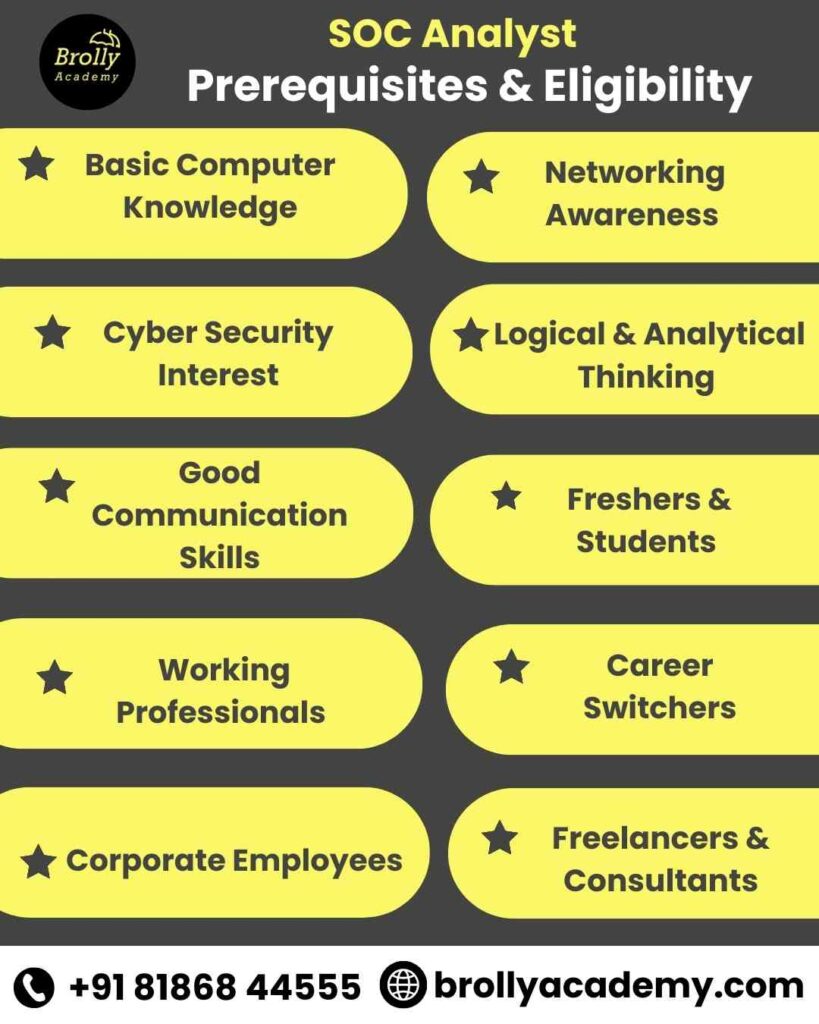
Who Should Learn SOC Analyst Training in Hyderabad?
SOC Analyst Coaching at Brolly Academy Hyderabad is designed for students, IT professionals, and career switchers who want to start or grow in the cyber security domain.
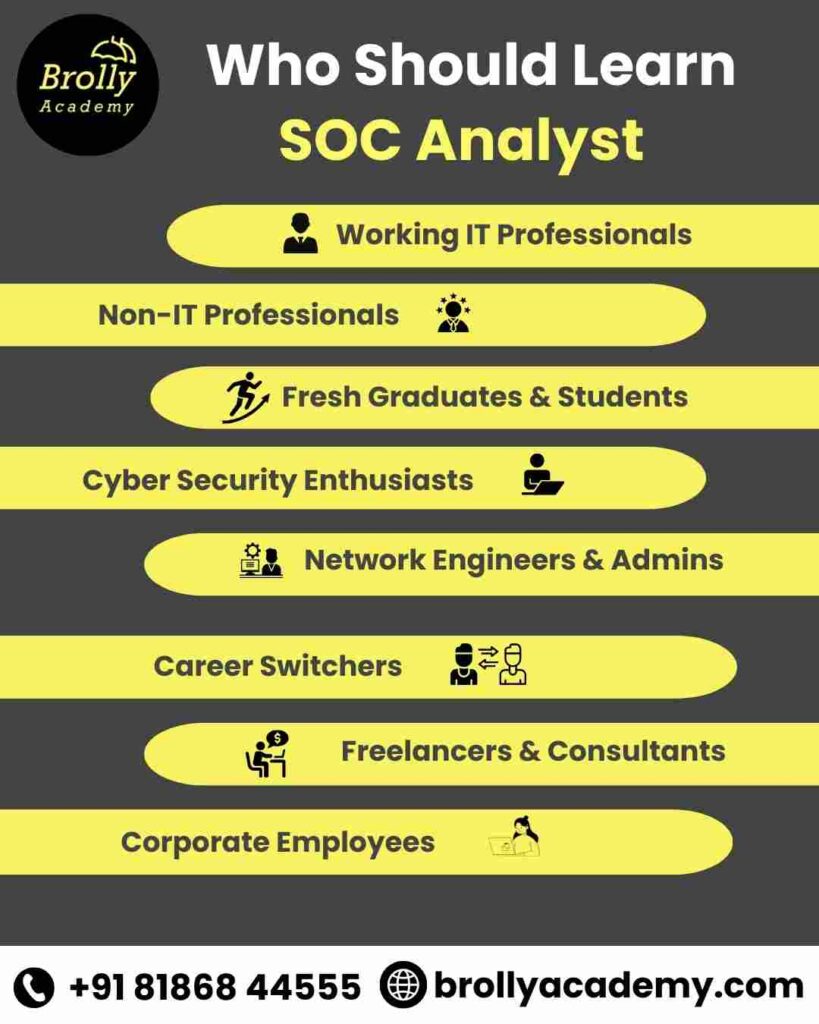
- Fresh Graduates & Students – B.Tech, B.Sc, MCA, MBA candidates who want to start a career in SOC Analyst jobs in Hyderabad.
- Working IT Professionals – Developers, testers, or IT support staff planning to switch into cyber security.
- Non-IT Professionals – Those interested in moving into SOC Analyst certification courses for career growth.
- Cyber Security Enthusiasts – Learners curious about threat hunting, log monitoring, and SIEM tools.
- Network Engineers & Admins – Looking to upskill in incident detection, response, and compliance reporting.
- Career Switchers – Professionals from Java, ERP, or Testing backgrounds wanting to move into SOC roles.
- Freelancers & Consultants – Planning to work on cyber security projects or consulting for clients.
- Corporate Employees – MNCs wanting to enhance their profile with SOC Analyst training in Hyderabad.
Career Opportunities after SOC Analyst Training in Hyderabad
Career Opportunities
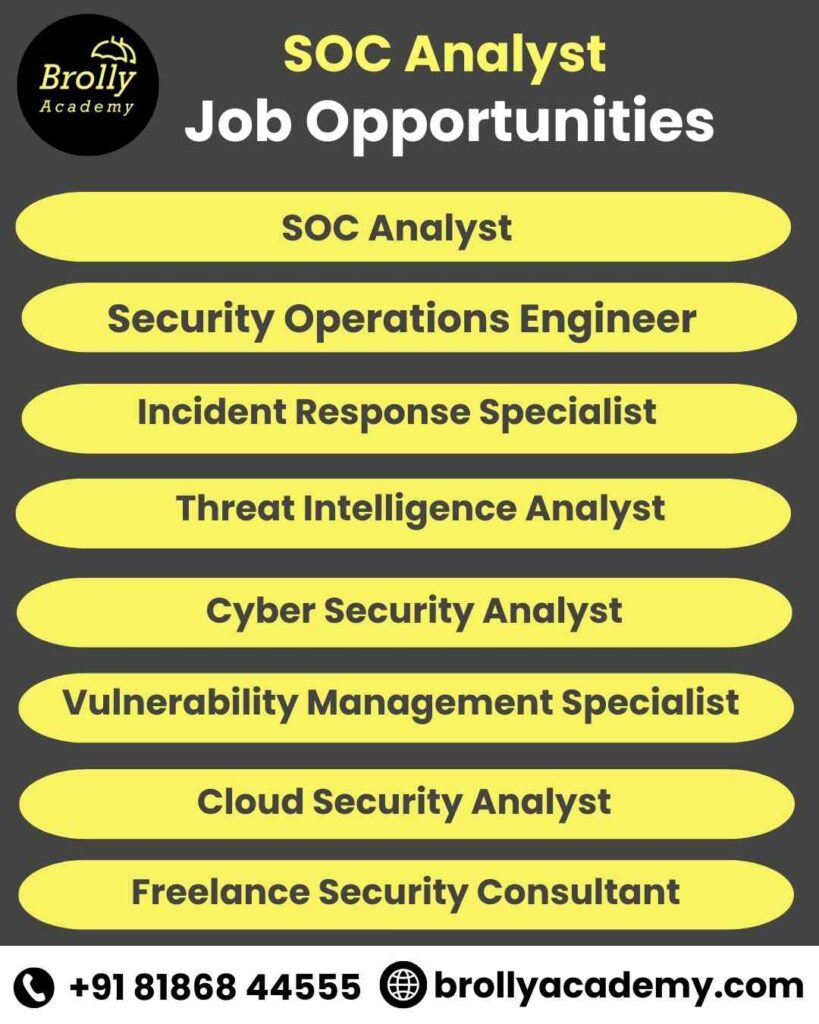
- SOC Analyst – Monitor security events, analyze logs, and respond to threats using SIEM tools like Splunk, QRadar, and ArcSight.
- Security Operations Engineer – Manage SOC infrastructure, configure monitoring tools, and improve detection rules.
- Incident Response Specialist – Handle real-time cyber attacks, mitigate risks, and perform root cause analysis.
- Threat Intelligence Analyst – Research emerging threats, track attack patterns, and provide actionable security insights.
- Cyber Security Analyst – Oversee vulnerability assessments, network monitoring, and security compliance reporting.
- SIEM Engineer – Deploy and manage SIEM platforms such as Splunk, ELK Stack, and QRadar for advanced monitoring.
- Vulnerability Management Specialist – Identify, analyze, and remediate vulnerabilities across enterprise systems.
- Cloud Security Analyst – Secure cloud platforms (AWS, Azure, GCP) through continuous monitoring, compliance enforcement, and incident response.
- Freelance Security Consultant – Provide cyber security consulting, incident monitoring, and compliance services to companies globally.
Over 20,000+ job openings available for SOC in Hyderabad for freshers
SOC Analyst Jobs in Hyderabad – Salary Range
Job Role | Average Salary (Hyderabad) | Salary Range (Freshers to Experienced) |
SOC Analyst (Entry-Level / L1) | ₹4.2 LPA | ₹3.0 LPA – ₹6.0 LPA |
SOC Analyst (Mid-Level / L2) | ₹6.5 LPA | ₹4.5 LPA – ₹9.0 LPA |
SOC Analyst (Senior / L3) | ₹9.0 LPA | ₹6.0 LPA – ₹14.0 LPA |
Incident Response Specialist | ₹8.5 LPA | ₹5.5 LPA – ₹13.0 LPA |
Threat Intelligence Analyst | ₹9.5 LPA | ₹6.5 LPA – ₹15.0 LPA |
SIEM Engineer (Splunk/QRadar/ELK) | ₹10.0 LPA | ₹7.0 LPA – ₹16.0 LPA |
Vulnerability Management Analyst | ₹7.5 LPA | ₹5.0 LPA – ₹12.0 LPA |
Cloud SOC Security Analyst | ₹9.2 LPA | ₹6.5 LPA – ₹15.0 LPA |
Freelance SOC Consultant | Variable | ₹4.0 LPA – ₹20.0+ LPA (project-based) |
SOC Analyst Training in Hyderabad
Our Achievements
15+ Batches Completed
10+ Years Trainer Expertise
264+ Students Placed
100% Placement Support
SOC Analyst Training in Hyderabad – Certifications
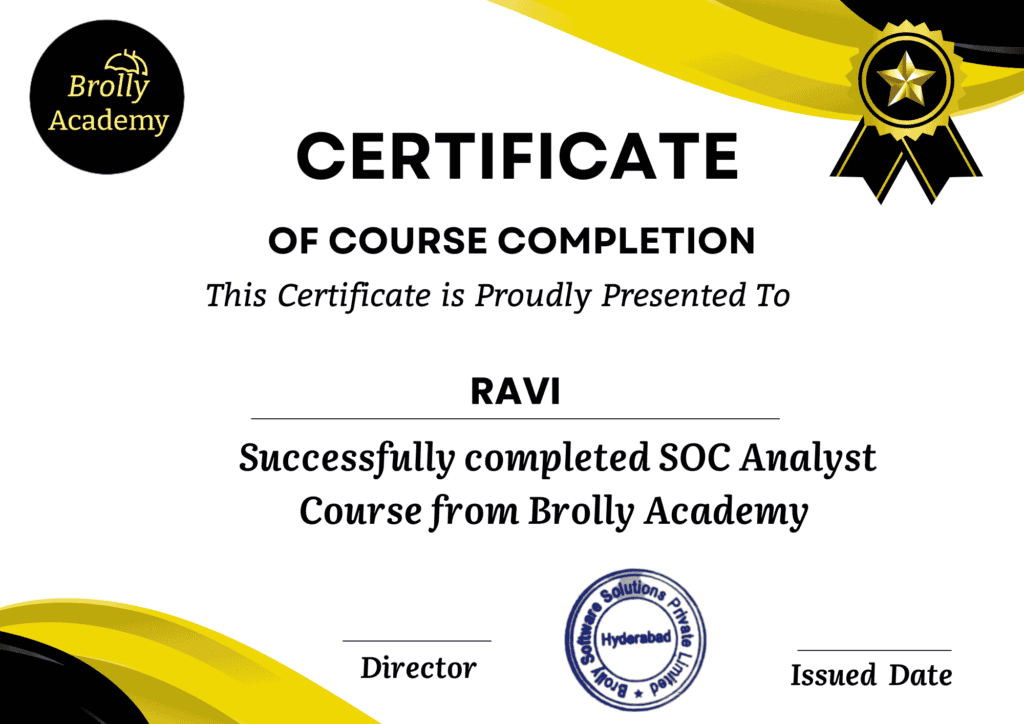
SOC Certifications You Will Receive
Completing the SOC Analyst Training at Brolly Academy gives you certifications that show you are job-ready in cyber security and SOC operations. These certificates prove your skills in log analysis, threat detection, incident response, and SIEM tools, helping you stand out in interviews and placements.
- SOC Analyst Course Completion Certificate
- SIEM Tools Certificate (Splunk, QRadar, ArcSight, ELK).
- Incident Response & Threat Hunting Certificate – for practical SOC operations.
- Google Analytics Certification (GA4)Hands-on Project Certificate – based on live security cases.
SOC Analyst Market Trends & Job Growth in Hyderabad 2026
Market Trends
- Rising Cybersecurity Needs : With cyber threats increasing, companies in Hyderabad are investing heavily in SOC teams to protect data and operations.
- SOC Analyst Demand : Every major IT, banking, and telecom company is setting up or expanding Security Operations Centers, creating steady demand for SOC Analysts.
- Adoption of SIEM Tools : Tools like Splunk, QRadar, ArcSight, and ELK Stack are widely used in Hyderabad, making trained professionals highly sought after.
- Entry-Level Hiring : SOC roles are among the top entry points into cybersecurity, with Hyderabad companies hiring freshers and upskilling graduates for analyst positions.
- Job Growth in Hyderabad : Hyderabad is one of India’s leading IT hubs, and SOC Analyst jobs are steadily growing across MNCs and startups.
- Career Progression : SOC Analysts can grow into roles like SOC Lead, Security Engineer, Incident Manager, and Cybersecurity Consultant with experience.
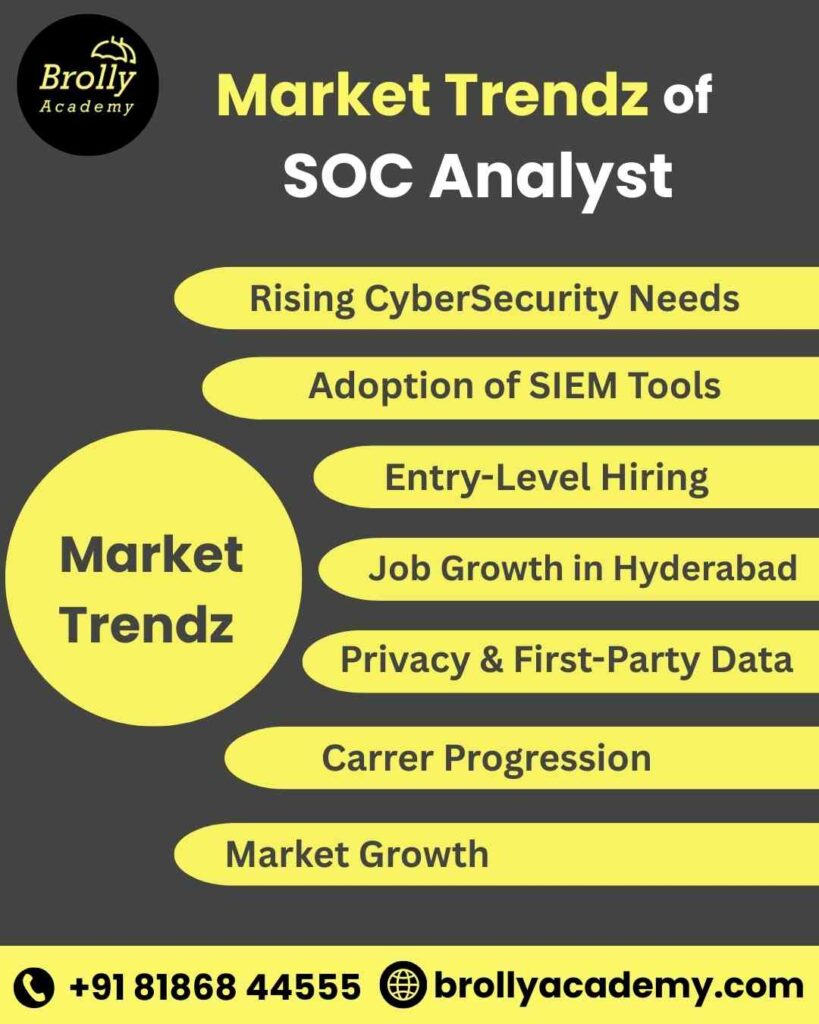
SOC Analyst Course in Hyderabad
FAQS
1. What is a SOC Analyst?
A SOC Analyst is a cybersecurity professional who monitors systems for threats, analyzes alerts, and responds to attacks. At Brolly Academy, students learn the skills needed to detect and stop real-world cyber incidents.
2. Who are able to join the SOC Analyst course in Hyderabad?
Graduates in IT, B.Tech, or computer science, networking professionals, and even freshers with interest in cybersecurity can join Brolly Academy’s SOC Analyst Training.
3. What tools will I learn in SOC Analyst Training?
The course covers tools like Splunk, QRadar, ELK Stack, ArcSight, Wireshark, and Nessus, which are widely used in global SOC teams.
4. How long is the SOC Analyst Training?
The training lasts 3 months, including theory, hands-on labs, and real-time project work.
5. Is the course available both online and offline?
Yes. Brolly Academy offers classroom training in Hyderabad and live online sessions with flexible schedules.
6. Do I get practical experience in this training?
Yes. Every student works on live SOC projects, SIEM simulations, and incident response cases to gain hands-on knowledge.
7. Will I get a certificate after completing the training SOC ?
Yes. Brolly Academy provides an industry-recognized SOC Analyst Certification after course completion.
8. What kind of placement support do you provide?
The institute offers resume preparation, mock interviews, HR support, and placement drives with top companies.
9. What is the salary of a SOC Analyst in Hyderabad?
Freshers earn ₹4.2 to ₹7 LPA, while experienced professionals can earn ₹12–15 LPA depending on skills and certifications.
10. What job roles are available after SOC Analyst Training?
You can apply for jobs like SOC Analyst (L1/L2), Cybersecurity Analyst, Threat Hunter, Incident Responder, and SIEM Specialist.
11. Do SOC Analysts need coding knowledge?
No. SOC Analysts mainly work on monitoring and investigating alerts. Some scripting (Python, PowerShell) may help, but coding is not mandatory.
12. Is SOC Analyst an entry-level job?
Yes. SOC Analyst is considered the first step in cybersecurity, ideal for freshers starting their career.
13. What is the full form of SOC?
SOC stands for Security Operations Center, where analysts monitor and protect IT systems from cyberattacks.
14. What certifications help SOC Analysts?
Global certifications like CompTIA Security+, CEH, Splunk Certified, and Cisco CCNA Security boost your profile.
15. Is SOC Analyst a good career choice?
Yes. Cyber threats are increasing worldwide, and SOC Analysts are in high demand with stable jobs and global opportunities.
16. What are the difference between SOC Analyst and Cybersecurity Analyst?
SOC Analysts monitor and respond to alerts, while Cybersecurity Analysts design policies and handle risk management.
17. What are common SOC Analyst interview questions?
- Interviewers may ask:
- What is SIEM?
- Explain IDS vs IPS.
- How do you respond to phishing?
- What is threat intelligence?
18. How many levels of SOC Analysts are there?
L1: Initial monitoring and alert triage.
L2: Deeper investigations and response.
L3: Advanced threat hunting and management.
19. What is Tier 1 SOC Analyst?
Tier 1 Analysts monitor alerts, analyze logs, and escalate threats. It’s the usual starting role for freshers.
20. Can SOC Analysts work from home?
Yes. Many companies in Hyderabad allow remote SOC jobs with secure monitoring systems.
21. How do I become a SOC Analyst?
You need training in SIEM tools, threat detection, and incident handling. Joining Brolly Academy’s SOC Analyst Training in Hyderabad prepares you step by step.
22. What makes Brolly Academy different?
Experienced trainers, hands-on experience, flexible schedules, 100% placement support, and lifetime LMS access make Brolly Academy stand out.
23. Is SOC Analyst a stressful job?
It can be demanding due to shift work and continuous monitoring, but proper skills and workflows reduce stress.
24. Is SOC Analyst training good for freshers?
Yes. It is one of the best entry points into cybersecurity, especially for fresh graduates in IT and computer science.
25. How much do SOC Analysts earn globally?
In India, salaries range from ₹4–15 LPA, while in the US and Europe, SOC Analysts earn $70,000–$100,000 per year.
26. Which companies hire SOC Analysts in Hyderabad?
Top recruiters include TCS, Wipro, Accenture, Deloitte, IBM, Infosys, and Tech Mahindra.
27. Is SOC Analyst in demand in Hyderabad?
Yes. Hyderabad is a hub for IT companies and MNCs, creating high demand for SOC Analysts with SIEM and security skills.
28. What is taught in the SOC Analyst syllabus?
The course covers cybersecurity basics, SIEM tools, incident detection, threat intelligence, compliance, and reporting.
29. Can non-IT students join SOC Analyst training?
Yes. With basic computer knowledge, even non-IT graduates can become SOC Analysts with the right training.
30. How does Brolly Academy prepare me for interviews?
Brolly Academy provides mock interviews, HR sessions, and real interview questions to help students confidently crack SOC Analyst job interviews.
Other Relevant Courses
Got more questions?
Talk to Our Team Directly
Contact us and our academic councellor will get in touch with you shortly.











